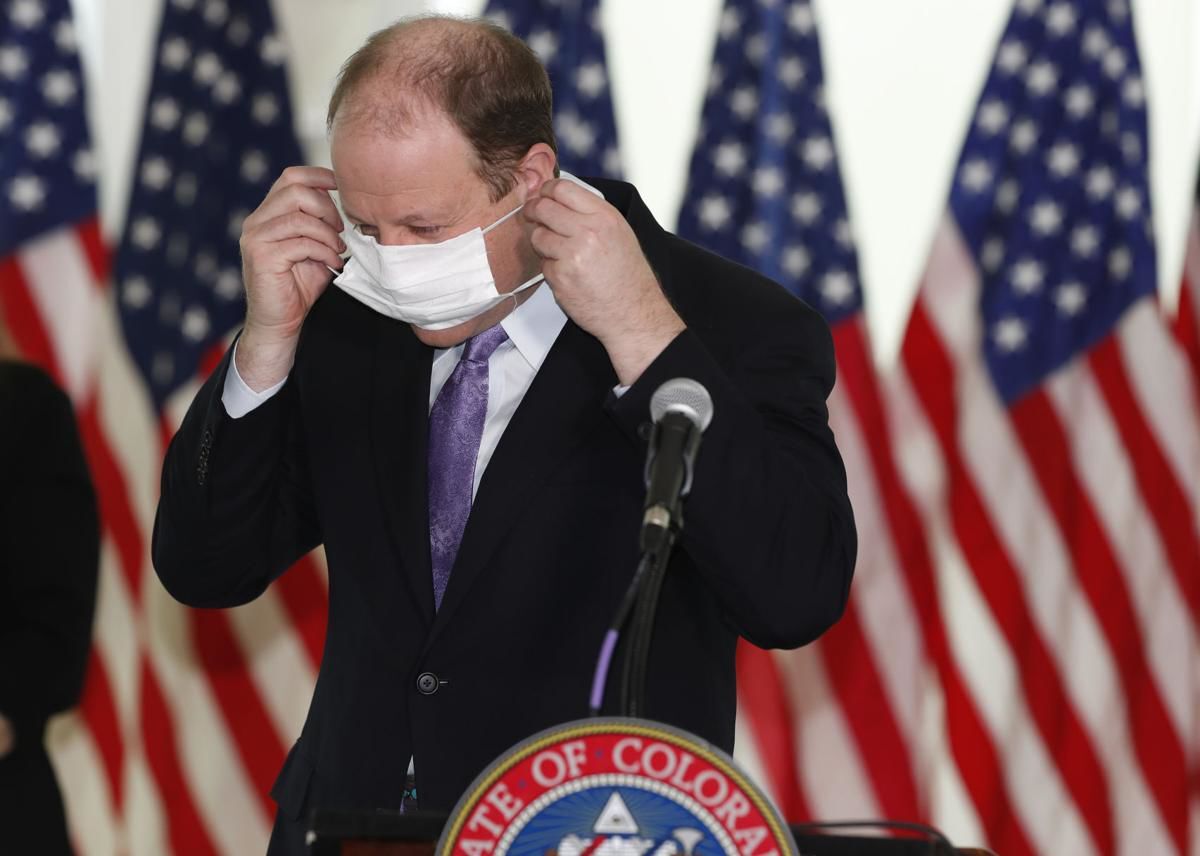Gov Polis: ‘Very likely’ coronavirus reached Colorado before first diagnosed case
The coronavirus “very likely” came to Colorado weeks before it was first diagnosed here, Colorado Gov. Jared Polis said at a news briefing Wednesday.
How long ago the virus touched ground here isn’t yet known, the governor said at the briefing, addressing lingering uncertainty nearly two months after the first confirmed case was announced. Health officials believe that early on, it could have been diagnosed as pneumonia and gone unrecognized as COVID-19, the governor said.
“We don’t know whether that first case in Colorado was in January or in February, but it’s very likely that the first diagnosed case in Colorado was not in fact the first case in Colorado,” Polis said. “That’s the same for states across the country.”
Experts at the Colorado School of Public Health estimated at the beginning of April that the first case of the coronavirus arrived in Colorado between Jan. 17 and Jan. 29. Officials with the Colorado Department of Public Health and Environment said Wednesday there is “no new estimate on the first infection in Colorado.”
“Our first case was confirmed on March 5 but it’s suspected that it was in Colorado earlier than that,” the department said. “We don’t have an estimate for that date as of now.”
The governor credited the state’s slowing rates of new cases and deaths to the social distancing measures, specifically the statewide stay-at-home order that made the past two months “feel like years in our lives.”
“This is a marathon,” Polis said. “This is something that’s going to be with us for many months to come.”
Modeling done at the beginning of the pandemic showed tens of thousands of coronavirus deaths among Coloradans, Polis said, but the state has so far averted those numbers — holding deaths to below 1,000 — through social distancing measures. The governor likened surviving the virus to dieting, saying that successfully suppressing it depends on long-term commitment and sustainability.
“You can’t eat right and exercise for two months, which we did, and then just go back to your old habits,” Polis said. “You can’t expect to keep the weight off if you do that. It’s got to be sustainable for the long-term if you want to maintain progress.”
Laura Rosenthal, vice president of the Colorado Nurses Association, spoke at the briefing Wednesday, to “share the reality of what myself and thousands of other health care practitioners are experiencing” in Colorado.
“COVID-19 is unlike anything I have ever seen in my 20 years as an experienced nurse,” Rosenthal said. “It is not an old-people disease, nor a sick-person disease. And although these populations are more susceptible to COVID-19, it affects all people.”
RELATED: Get more live updates on the coronavirus in Colorado from the Gazette
Even with warmer weather ahead and a gradual reopening of the state, “continued diligence” is vital, Rosenthal warned.
“I know it is easy to believe COVID will not affect you, but it already has,” she said. “It has affected all of us in Colorado, and although you may hear Governor Polis talk about declining numbers, we need to remember its effect.”
As of Wednesday afternoon, 921 Coloradans had died of the coronavirus and 17,830 had tested positive for the disease, according to data from the state Department of Public Health and Environment. As of Tuesday, the growth rate of the virus in Colorado was about 2%, the governor said.
In El Paso County, where 78 people have died of the virus, county commissioners recently approved a proposal to allow high schools to develop alternative graduation ceremonies, and plan to request a waiver from Polis’ ban on gatherings of no more than 10 people. The ban has been openly criticized by commissioners for having a “one-size-fits-all” approach to the state’s coronavirus restrictions.
The state had not yet received that request as of Wednesday morning, the governor said at the briefing. He added that school districts have the option to do virtual commencements or delay them indefinitely.
“I think what’s important is as a state we celebrate this rite of passage for our graduating seniors,” Polis said. “We want to honor that. We will work with our superintendents to do that in the best way.”
The governor also used the briefing to give updates on the state’s medical supplies.
The state has received about 2.5 million surgical masks, 116,065 face shields, 195,109 gowns, 1,640,100 gloves and 534,474 N95 face masks, Polis said. Additional personal protection equipment will be dispensed to senior care facilities, he said, where some of the most vulnerable are. Nearly 40% of the medical supplies have been sent to first responders.
The Gazette’s Evan Wyloge contributed to this report.
RELATED: Get more live updates on the coronavirus in Colorado from the Gazette
Get OutThere
Signup today for free and be the first to get notified on new updates.




